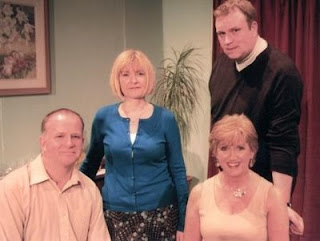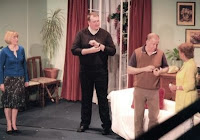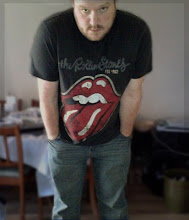 Four nights, and to be completely honest four completely different plays. I fully believe we got all our lines right – just different ones on different performances, and perhaps not always in the right order. But what does it matter? We got across the spirit of the piece and the audience enjoyed themselves. The question is, did we?
Four nights, and to be completely honest four completely different plays. I fully believe we got all our lines right – just different ones on different performances, and perhaps not always in the right order. But what does it matter? We got across the spirit of the piece and the audience enjoyed themselves. The question is, did we?Before each performance the cast would gather together, hug, shake hands and wait for the director to give his rousing speech: “Keep er lit!” “Take it till them!” and two other classics that somehow escape my memory right now. We would offer support and mutual affirmations and await the call for starters. Two of the cast would make their way up to the stage while the other two would wait nervously in the dressing room.
Every night during the twenty odd minutes before we would be needed onstage we would run lines, have long periods of nervous silence and every night she would turn to me at some point and ask the same question. “Why do we do it?”
 Every night my answer was the same, “Well I do it cause they were running out of actors and I never did learn how to say no with any conviction. Why are you doing it.” I can’t remember if she ever replied vocally but her expression always answered in full. And I would try to pull what I hoped was an empathetic expression of concurrence.
Every night my answer was the same, “Well I do it cause they were running out of actors and I never did learn how to say no with any conviction. Why are you doing it.” I can’t remember if she ever replied vocally but her expression always answered in full. And I would try to pull what I hoped was an empathetic expression of concurrence.For various reasons this was one of the most stressful plays we have done as a group. You could perhaps attribute part of our negative conversation to nerves, but not completely. At the end of the final performance, had you asked the above question of us, I firmly believe that you would have seen the same expressions that we used in the dressing room two hours before. Granted it would have been tinged with the relief of a passable conclusion and the fatigue of adrenaline exhausted. But it would have been there.
Why do we do it? It is certainly not for public adulation, or fame or celebrity. It is hardly a career booster or CV filler. I suppose some people do it for the buzz that you get when you stand in front of an audience – but I have never been a big fan of buzzes. Perhaps there is a certain amount of camaraderie involved in the process, perhaps it is facing and overcoming a challenge. I can’t answer for the rest of the group, or anyone else who repeatedly does something they don’t really enjoy doing and can’t imagine why, but for me it is a combination.
 I wonder what it is like to go to war – to stand shoulder to shoulder with your comrades as the bullets start flying. I will never know what that experience is like. But on a vastly smaller scale I remember an incident that took place, coincidentally, after a play.
I wonder what it is like to go to war – to stand shoulder to shoulder with your comrades as the bullets start flying. I will never know what that experience is like. But on a vastly smaller scale I remember an incident that took place, coincidentally, after a play.It was many years ago – I was 20. It was my first proper theatrical production – Stags and Hens. I am extremely fond of that little play and can still remember my characters opening line – “Eh! Dickhead! That’s my home town you’re talking about!” or in my disastrous attempt at a Liverpool (with a hint of London) accent “Eh, dich-ed, tha’s ma ‘ome tawan your taw-hin boa!” – but I digress. All you need to know about it is that there is a relatively large cast. The wrap party was being held in a little club in Coleraine. It was empty when we arrived and we immediately occupied a little corner booth hidden from the main part of the club.
Soon after we arrived one of the guys was on his way to the bar to buy a round when a group of students arrived. They must have failed a test or run out of pot noodle or something for they were in a foul mood and desperate for a fight. When they saw our friend in his ridiculously colourful clothes the cry went up “Fag!” and they started giving him dog’s abuse.
I’m getting to the point – stay with me.
When he protested they began to shove him about oblivious to the fact that there was anyone else in the club. There were eight of them and just one of him so they fancied their chances. I can still remember the looks on their faces as we appeared from around the corner and stood behind him. Then it, as the young people like to say, all kicked off.
 It was the first and only time I was involved in a mass brawl and, say it softly, I liked it. I wasn’t fighting for myself – I was fighting for the honour of one of our group. We stood together like brothers, comrades. We were individuals but we were one body. We were the musketeers. We were the invincible. We were thrown out by the bouncers – but not before we had made our point.
It was the first and only time I was involved in a mass brawl and, say it softly, I liked it. I wasn’t fighting for myself – I was fighting for the honour of one of our group. We stood together like brothers, comrades. We were individuals but we were one body. We were the musketeers. We were the invincible. We were thrown out by the bouncers – but not before we had made our point.I am a pacifist. I want to make that abundantly clear. I do not condone violence of any kind. But the feeling I got when facing difficulty as a group – that was addictive. I wouldn’t want to do a play that was plain sailing, and I wouldn’t want to face a difficult play alone. I need the feeling that comes from facing group challenges, looking out for each other but never fully relying on each other.
That is why I did the play and why I will be practising my empathetic expression of concurrence for when we put it on in Newtownabbey in September.




